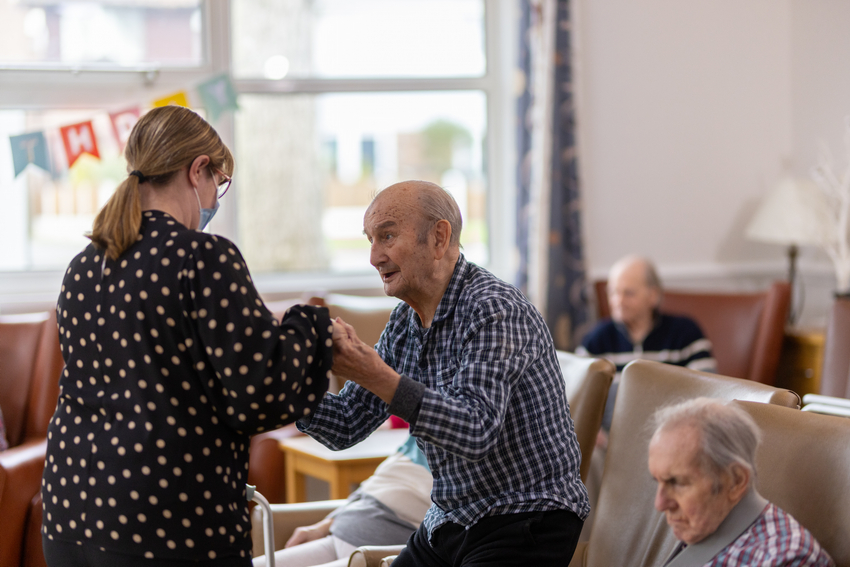
A dementia diagnosis does not mean you can’t continue to live well and enjoy a great quality of life. With the support of your friends, family and loved ones, there are plenty of adjustments that can be made to ensure that you continue to live ‘Life in Colour’. In this article, we will be discussing how you can offer support to your parent or loved one who is living with dementia, and work to enhance their lives as much as you can in what is sure to be a difficult time for you all.
What is dementia?
Dementia is not a disease in itself. It is a term used to describe a group of symptoms that occur when specific diseases or conditions affect the brain. Over 200 different types of dementia exist today. However, the most common dementia types include Alzheimer’s disease, Vascular dementia and Lewy body dementia. For more information on the different types of dementia, and who is affected by the disease, visit our resources and advice section to see our help and advice for people with dementia.
Stages of dementia
Dementia can be split into three stages, and at each stage of your loved one’s dementia diagnosis, there are certain signs to be aware of:
1. Early stage dementia: At this stage of dementia, symptoms might be mistaken for stress or depression – or may even be overlooked as simply a sign of getting older.
2. The middle stage of dementia: In this stage, the person’s symptoms will impact their daily lives more significantly, and they will require some extra support with their day-to-day lives.
3. The later stage of dementia: By this stage, the person’s symptoms will be more severe and they will require significant support for their day-to-day lives. They may also benefit from moving into a dementia-friendly care home for full-time support and care.
Throughout each stage of dementia, there are many ways that you can offer support to help enhance your loved one’s life and experiences with the disease. Join us as we explore how you can help your parent or loved one through their dementia experience and assist them in living ‘Life in Colour’.
Did you know there are over 200 different types of #dementia & everyone’s experience with it is unique?
Whilst dementia can impact anyone at any age, it’s most common in people over 65.
Learn more about the most common dementia types: https://t.co/bNi698VMJR @dementiauk pic.twitter.com/qjkJ2Xe8jY
— Borough Care (@BoroughCareLtd) September 15, 2022
Caring for your loved ones after their dementia diagnosis
Choosing to take on the role of becoming a caregiver, whether it be for a parent or a loved one, is a truly remarkable decision to make. Whilst it can be both positive and rewarding to care for your loved one, it isn’t without its challenges. Becoming a caregiver is a big decision to make and will have a significant impact on your day-to-day life. We understand that taking on this role can take a huge toll on your emotional and mental well-being. So, we wanted to offer our advice and support to help assist you in the process of becoming a carer for your loved one.
Understanding how to communicate with someone with dementia
One of the initial challenges that you may find as a carer for someone with dementia is adapting to the way in which you and your loved one communicate. As dementia directly impacts memory and brain function, it’s highly likely that your loved one will find challenges in communicating with you in the same way that they always have.
To help enhance their communication experience, ensure that you are patient and understanding when speaking to your loved one. If your parent or loved one needs you to repeat something, try to keep calm and reassure them rather than pointing out that you’re having to repeat yourself over and over. Most importantly, however, ensure that you create a space where they feel completely safe and supported as, when they do, they’ll feel more comfortable communicating with you.
We know how difficult it is to receive a #dementia diagnosis – whether it be you or a loved one. To offer our support, we've put together resources & advice that cover:
👫 Help for people with dementia
💷 Care home funding
🏡 Moving into careLearn more: https://t.co/bNi698VMJR pic.twitter.com/Cde9Fs7DqI
— Borough Care (@BoroughCareLtd) September 14, 2022
Finding support for yourself and your loved ones
As a caregiver, it can be easy to overlook your own needs and emotions as you prioritise those of your loved one. It’s important that you take the time to look after yourself and your well-being, and seek support if you’re in need of it. One of our best pieces of advice would be to surround yourself with a support network of brilliant people – whether that be friends, family or a professional. Sometimes, you just need to express yourself and talk things through – especially in tough and challenging times. If you spend time prioritising your own health and well-being then you can be sure that when you’re showing up for your loved one you’re your best self. As a result, you can ensure that you give them the best care they could have.
Maintaining a positive attitude and relationship with your loved one
We know that keeping positive is a big thing to ask of yourself in what is sure to be a very difficult time for you and your family. However, your loved one will feed off your energy and, if you are suffering with your mental and emotional well-being, your loved one will pick up on it, which may cause problems with communication. We’ve mentioned the importance of seeking support from friends, family and even professionals during this challenging time for your own mental well-being. However, having a support network will not only help you but your loved one as well.

Supporting your loved one to live well with dementia
In addition to becoming a caregiver for your parent or loved one, there are also a few other things you can to do encourage them to live well with dementia.
Keep socially active
Just as it is essential for you to talk about your experience as a caregiver, it’s equally as important that your loved one who is living with dementia continues to be socially active. Whether this is through communicating with their family, friends or medical professionals, it’s incredibly beneficial. In an article from Alzheimers.org.uk, they suggest that some useful ways for people with dementia to keep socially active include:
1. Going to talking therapy e.g. counselling: This is particularly helpful in helping your loved one come to terms with their dementia diagnosis and express their feelings towards their experience.
2. Trying life story work: This involves your loved one recording their life experiences (through writing, speaking or recording).
3. Experimenting with reminiscence: This focuses on the individual reflecting on their past through photos, objects or music, and discussing it with a friend, family member or healthcare professional.
Maintain an active and healthy lifestyle
Whilst keeping yourself active and leading a healthy lifestyle is important for everyone, it can have a significant impact on the mental well-being of those who are living with dementia. Something as simple as having a daily routine, which includes eating a balanced diet and going on a walk, can do wonders for people with dementia and can help prevent depression symptoms from developing. As a caregiver, if you can encourage and empower your loved one to get their daily steps in, connect with other people and eat a balanced diet, it’ll make the world of difference to their overall experience with dementia.







